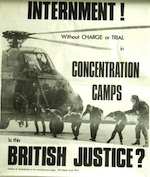
By Sandy Boyer (for Socialist News)
After 40 years, internment without charge or trial has returned to Northern Ireland.
In August 1971, the British army picked up and imprisoned 342 men who were believed, often erroneously, to be key members of the Irish Republican Army (IRA). They were never charged with any crime, but they could only be released by a committee that met in secret and gave no reason for its decisions.
Today, it is former political prisoners who are being interned. Their “licenses”--known as parole in the U.S.--are being revoked by a British cabinet minister, the Secretary of State for Northern Ireland. They aren’t charged with any crime, and he has given no reason for ordering them back to prison except that they’re a “security risk” or a “danger to society.”
Their cases can be reviewed by a commission appointed by the same minister. The prisoner can present evidence, but this is essentially meaningless since they have never been told why they’re in prison in the first place. The commission can meet in secret. The only reason they need to give for refusing to release a prisoner is that he or she is a “danger to society.”
Martin Corey has no idea why he is back in prison. He was imprisoned for IRA activity in December 1973 when he was 19 years old. He was released in June 1992, returned home, established a business and formed an ongoing relationship. He became a highly respected member of his local community in Lurgan, County Aramgh.
In the early hours of April 16, 2010, almost 18 years after his original release, the police appeared at Martin Corey’s door and took him away to prison. He wasn’t charged with any crime and wasn’t told what, if anything, he was supposed to have done. He was simply informed that the Secretary of State for Northern Ireland had revoked his license because he was a “security risk.”
More than a year later, Martin Corey is still interned. He was recently told that he’ll be in prison for at least another year because his application for release has been denied, and he can’t reapply until next year.
Corey is a member of Republican Sinn Fein, a legal political party throughout Ireland. It is opposed to the present power-sharing administration in Northern Ireland because it believes the administration perpetuates British rule. This can be used to justify Martin Corey’s internment because he is a “dissident republican” and “a threat” to the Northern Ireland peace process.
Marian Price, the only woman political prisoner in Northern Ireland, was interned in May. She had appeared in court on a charge of “encouraging support for an illegal organization.” The judge granted her bail, but the police detained her before she could even leave the courthouse.
The Secretary of State for Northern Ireland revoked her license from a conviction dating back to 1973. According to the Belfast Telegraph, the minister said that she posed a threat that had “significantly increased” in recent times. Price is a leading member of the 32 County Sovereignty Movement that believes that only an armed struggle can end British rule in Ireland.
She is in solitary confinement in an otherwise all-male prison. There are serious concerns about her health. Imprisoned in Britain in 1973, Price went on hunger strike and was force-fed more than 200 times. After she was returned to Northern Ireland, Price developed severe anorexia nervosa and was freed by the British government because they were afraid she was about to die. Today, she is suffering from crippling rheumatoid arthritis.
There are probably hundreds of former political prisoners in Northern Ireland who have been released on license. Any one of them could be interned indefinitely at any time for any reason.
Ending internment and freeing the prisoners won’t be easy or quick. It will only be won by a movement that brings together everyone who is willing to support political prisoners, whether or not they agree with them politically.
Eamonn McCann, the Irish socialist leader who was one of the organizers of the civil rights movement in Northern Ireland, recently addressed a meeting called to support the prisoners:
“We need a campaign for decent treatment of the prisoners, a recognition of their human rights and support for the release of the prisoners. People right across the political spectrum should come together as best they can to mount a major campaign on behalf of the prisoners.”
* The campaign to release Martin Corey is located at www.releasemartincorey.com
![[Irish Republican News]](https://republican-news.org/graphics/title_gifs/rn.gif)
![[Irish Republican News]](https://republican-news.org/graphics/title_gifs/harp.gif)

